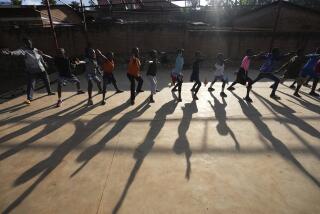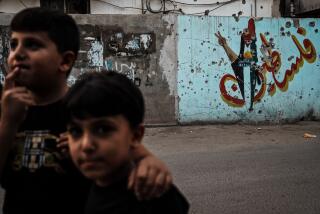Scholars Write the Book on Burundi
- Share via
BUJUMBURA, Burundi — People here agree that in the 39 years since independence, Burundi’s history has been scarred by political assassinations, coups, massacres and civil war.
That’s where the consensus ends, because this is a country without history books.
There are two versions of history in this central African nation: one for the minority but dominant Tutsis, the other for majority Hutus. They are passed on by word of mouth, accentuating the hatreds and suspicions dividing the two communities.
Now, with the support of the United Nations, a group of Burundian and foreign historians is going to try to come up with an account of modern events they hope will help bridge the gap.
Since Burundi’s independence from Belgium, hundreds of thousands of people have died in recurring cycles of ethnically based violence driven by power struggles, attacks and reprisals. A civil war has been going on since October 1993.
Few agree on who is to blame or on the origins of the conflict, because myth is often perceived as reality.
“You don’t have compromise between the two. . . . Even foreigners have different views of our history,” said Willy Nindorera, a Tutsi who taught history in secondary school. “If I want to teach modern history I must have a source, but people do not want to speak about this part of history, or they will only speak off the record.”
During his nine years as a teacher, Nindorera was unable to teach modern Burundian history because there are no straightforward texts.
The young Burundians who jam into Bujumbura’s many bars often argue over what exactly has happened in their country.
Both communities agree that certain events--such as widespread massacres in 1965, 1972, 1988 and 1993--took place. What they don’t agree on is who was responsible for setting the slaughter in motion and how many people from each group were killed.
“Burundians remember their past in such a way that it contributes to generate hostility among the people,” President Pierre Buyoya wrote in his book, “Building Peace in Burundi. Mission: Possible.”
It is one of only 11 books on Burundi on the shelves of the Librairie St. Paul, Bujumbura’s only bookstore. All 11 were written by Tutsi politicians, and only five attempt to analyze Burundi’s volatile history since 1966, when King Ntare V was deposed in a military coup four years after independence.
The monarchy dated to the 12th century, and according to most accounts, it was accepted by both Tutsis and Hutus. Belgian colonial administrators who carried out Burundi’s only census, in 1930, decided that 14% of the population was Tutsi, 85% Hutu and 1% Twa.
Since the overthrow of the monarchy, Tutsis have been able to dominate the country of 6 million people through their control of the army.
In the history project, which is sponsored by UNESCO, a committee of six Burundians and nine foreign historians has selected about 40 Burundian and foreign authors to write a general history as well as school texts. The goal is to finish by 2003, said Emile Mworoha, a Tutsi professor of history and member of the committee.
“There is a big gap in Burundian history, like when we go from the monarchy to the republic and the big issues of war and conflict,” Mworoha said. “There has been little effort to understand this period and interpret it in a uniform way.”
Most historians agree Burundi’s ethnic problems began between 1965 and 1966 when a Hutu prime minister was assassinated and a Tutsi overthrew the monarchy and declared Burundi a republic.
Before these events, historians say, there were no real divisions between Hutus and Tutsis. But with the monarchy out of the way, the struggle for power became a direct battle between the two communities.
The animosity could be a big snag for the history project.
“You should not collect information from Burundi unless you can find a Hutu who has good information, because the Tutsis will not tell the truth,” said Joseph Karumba, a Hutu living in exile in neighboring Tanzania.
He said Tutsis portray Hutus as “ignorant, illiterate, not wise and not capable of leading the country.”
Mworoha, who studied at the Sorbonne in Paris, said the book will be objective--three of the Burundians on the oversight committee are Hutus, three are Tutsis--and will avoid pointing fingers at anyone.
“History is a science, and there’s a methodology to respect. . . . What’s important is not ethnicity but the scientific approach,” he said. “Whatever you do, there will always be people who question it, and there are those who have made it their careers to protest.”
Michele Wagner, who teaches African history at the University of Minnesota and has been selected as one of three main editors of the Burundian text, hopes the work can be completed.
“History is a kind of collective psychotherapy,” she said. “It’s a place where people can talk about what has gone on in the past. If no books talk about the recent history, there’s no way people can talk to each other about it.”
More to Read
Sign up for Essential California
The most important California stories and recommendations in your inbox every morning.
You may occasionally receive promotional content from the Los Angeles Times.













